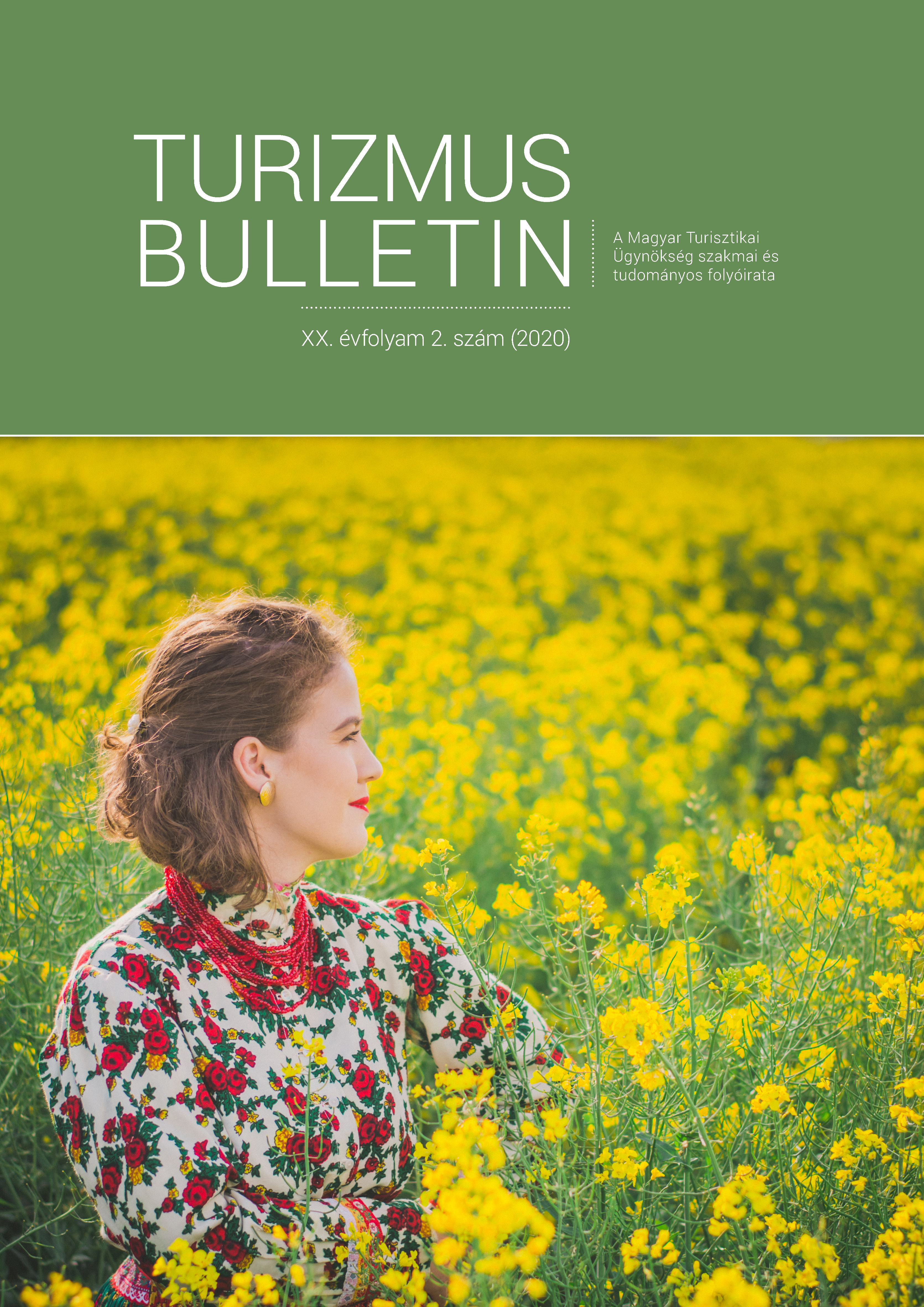An investigative study of the use of digital marketing tools and methods among Hungarian tourists
DOI:
https://doi.org/10.14267/TURBULL.2020v20n2.1Abstract
Digitalisation cannot be avoided. It has become so prominent due to innovation, to the development of information technology tools and also to the internet and smartphones which have now transformed the tourism industry. Digital marketing tools and methods have also attracted increasing interest among Hungarian tourists. The study focuses on the extent of the potential in Hungary, and its aim is to investigate when and in what way Hungarian tourists are involved in digital tourism. Both primary and secondary research were carried out between October 2018 and March 2019 using a sample of more than 500 respondents. The results show how Hungarian tourists relate to digital developments in tourism.
References
BEATRICE, S. – MIHÃLCESCU, C. (2013): The Impact And Perspectives Of The E-Tourism At A Global Level. Romanian Economic Business Review. Romanian-American University. (4.1). pp. 289-296.
BENYON, D. – QUIGLEY, A. – O'KEEFE, B. – RIVA, G. (2014):Presence and digital tourism. AI & Society. 29(4). pp. 521–529. https://doi.org/10.1007/s00146-013-0493-8
BOOMS, B. – BITNER, M. J. (1981): Marketing Strategies and Organizational Structures for Service Firms. In: Donnelly, J. H. – George, W. R. (eds): Marketing of Services. Chicago: American Marketing Association. pp. 47–51.
BUHALIS, D. – JUN, S. H. (2011): E -Tour i sm .Bournemouth University, UK.
BUHALIS, D. (2003): eTourism: Information technology for strategic tourism management. Prentice Hall, Harlow, UK.
BUHALIS, D. – LAW, R. (2008): Progress in information technology and tourism management: 20 years on and 10 years after the Internet – The state of eTourism research. Tourism Management. 29(4). pp. 609–623. https://doi.org/10.1016/j.tourman.2008.01.005
FRICKER, R. D. – SCHONLAU, M. (2002): Advantages and Disadvantages of Internet Research Surveys: Evidence from the Literature. Field Methods. 14(4). pp. 347–367. https://doi.org/10.1177/152582202237725
GRETZEL, U. – SIGALA, M. – XIANG, Z. – KOO, C. (2015): Smart tourism: foundations and development. Electronic Markets. 25. pp. 179–188. https://doi.org/10.1007/s12525-015-0196-8
HAPP É. – IVANCSÓNÉ HORVÁTH ZS. (2018): A digitális turizmus a jövő kihívása – új szemléletmód a turizmusban. In:Csapó J. – Gerdesics V. – Törőcsik M. (szerk.): Generációk a turizmusban. I. Nemzetközi Turizmusmarketing Konferencia. Tanulmánykötet. pp. 237–246.
HORVÁTH D. – BAUER A. (2016): Marketingkommunikáció. Stratégia, új média, fogyasztói részvétel. Akadémiai Kiadó, Budapest.
HÖJER, M. – WANGEL, J. (2015): Smart Sustainable Cities: Definition and Challenges. In: Hilty, L. M. – Aebischer, B. (eds): ICT Innovations for Sustainability, Advances in Intelligent Systems and Computing. New York, Springer. pp. 333–349. https://doi.org/10.1007/978-3 -319-09228-7_20
LAW, R. – CHENG CHU CHAN, I. – WANG, L. (2018): A comprehensive review of mobile technology use in hospitality and tourism. Journal of Hospitality Marketing & Management.27(6). pp. 626–648. https://doi.org/10.1080/19368623.2018.1423251
LOPEZ de AVILA, A. (2015): Smart Destinations: XXI Century Tourism. Presented at the ENTER2015 Conference on Information and Communication Technologies in Tourism, Lugano, Switzerland, February 4-6.
MITEV A. Z. – HORVÁTH D. (2008): A posztmodern marketing rózsaszirmai. Vezetéstudomány/Budapest Management Review.39(9). pp. 4–18.
NEMESLAKI A. – SZIVA I. (2016): Átalakuló fogyasztói szokások. In: Sziva I. – Nemeslaki A. (szerk.): Utazás E-Világban. Internet és versenyképesség a turizmusban. Budapest: Információs Társadalomért Alapítvány, INFOTA Kutatóintézet. pp. 58–73.
PÉCSEK B. (2019): Nyaralás alatti munkavégzés: a workcation turizmus elméleti és gyakorlati kérdései. Turizmus Bulletin. 19(1). pp. 4–13.
SZIGETVÁRI J. (2018): 10 év érdekes mozzanatai a digitális turizmusban – Miképpen vált a turizmus az egyik legdigitálisabb ágazattá, és mi várható a jövőben. Plenáris előadás. Nemzetközi Turizmus Konferencia. Széchenyi István Egyetem, Kautz Gyula Gazdaságtudományi Ka r, Győr.
WANG, D. – XIANG, Z. – FESENMAIER, D. R. (2016): Smartphone Use in Everyday Life and Travel. Journal of Travel Research. 55(1). pp. 52–63. https://doi.org/10.1177/0047287514535847
Internetes források
eNET (2013): A szállásfoglalás csaknem fele interneten történik. http://www.enet.hu/hirek/a-szallasfoglalas-csaknem-fele-interneten-tortenik/?lang=hu, Letöltve: 2019. június 27.
PAJ OR C S. (2019): Aktuális trendek a turizmusban c. előadás a Digitális túraterv a külföldi vendégek megszólítására rendezvény keretében. La Fabbrica étterem, Budapest, Sas u. 8. 2019. június 14. https://drive.google.com/file/d/1_EDSPC_Wk9qkbyehaoYXh5YpX3YKgEun/view, Letöltve: 2019. június 25.
STATISTA COUNTRY REPORT (2019): Hungary.https://www.statista.com/study/48386/hungary, Letöltve: 2019. május 20.
STATISTA DIGITAL MARKET OUTLOOK (2019): Etravel, Hungary. https://www.statista.com/outlook/359/139/etravel/hungary, Letöltve: 2019. május 20.
TURIZMUS.COM (2018): Tarol az online a szálláshely-szolgáltatók piacán. https://turizmus.com/szallashely-vendeglatas/tarol-az-online-a-szallashely-szolgaltatok-piacan-1157231, Letöltve: 2019. július 06.

